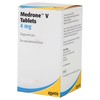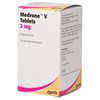Medrone V
Medrone V Tablets are indicated for the treatment of, or as part of a therapeutic regime for, inflammatory and allergic conditions such as: allergic or non-specific inflammatory dermal conditions, musculo-skeletal conditions, ocular/otic inflammatory conditions and other inflammatory/allergic conditions that are likely to respond to corticosteroid therapy, e.g. autoimmune disorders.
Medrone V Tablets are presented as oval, pink tablets that have been scored for easy and accurate dosing.
Medrone V Tablets 4mg
£0.26Medrone V Tablets are an oral glucocorticoid for the treatment of inflammatory and allergic conditions in cats and dogs. Such conditions include allergic or non-specific inflammatory dermal...[More info]
Medrone V Tablets 2mg
£0.17Medrone V Tablets are an oral glucocorticoid for the treatment of inflammatory and allergic conditions in cats and dogs. Such conditions include allergic or non-specific inflammatory dermal...[More info]
Contra-indications, warnings, etc
Systemic corticosteroid therapy is generally contra-indicated in patients with renal disease and diabetes mellitus.
Corticosteroids are not recommended for use in pregnant animals. Administration in early pregnancy is known to have caused foetal abnormalities in laboratory animals. Administration in late pregnancy may cause early parturition or abortion.
Anti-inflammatory corticosteroids, such as methylprednisolone, are known to exert a wide range of side-effects. Whilst single high doses are generally well tolerated, they may induce severe side-effects in long term use and when esters possessing a long duration of action are administered. Dosage in medium to long term use should therefore generally be kept to the minimum necessary to control clinical signs.
Steroids themselves, during treatment, may cause Cushingoid symptoms involving significant alteration of fat, carbohydrate, protein and mineral metabolism, e.g. redistribution of body fat, muscle weakness and wastage and osteoporosis may result. During therapy, effective doses suppress the Hypothalamo-Pituitreal-Adrenal axis. Following cessation of treatment, signs of adrenal insufficiency extending to adrenocorticol atrophy can arise and this may render the animal unable to deal adequately with stressful situations. Consideration should therefore be given to means of minimising problems of adrenal insufficiency following the withdrawal of treatment, e.g. dosing to coincide with the time of the endogenous cortisol peak (i.e. in the morning with regard to dogs and the evening with regard to cats) and a gradual reduction of dosage (for further discussion see standard texts). Systemically administered corticosteroids may cause polyuria, polydipsia and polyphagia, particularly during the early stages of therapy. Some corticosteroids may cause sodium and water retention and hypokalaemia in longer term use. Systemic corticosteroids have caused deposition of calcium in the skin (calcinosis cutis). Corticosteroids may delay wound healing and the immunosuppressant actions may weaken resistance to or exacerbate existing infections. In the presence of bacterial infection, anti-bacterial drug cover is usually required when steroids are used. In the presence of viral infections, steroids may worsen or hasten the progress of the disease.
Gastrointestinal ulceration has been reported in animals treated with corticosteroids and g.i.t. ulceration may be exacerbated by steroids in patients given non-steroidal anti-inflammatory drugs and in animals with spinal cord trauma. Steroids may cause enlargement of the liver (hepatomegaly) with increased serum hepatic enzymes.
Concurrent administration of barbiturates, phenylbutazone, phenytoin or rifampicin may enhance the metabolism and reduce the effect of corticosteriods.
During a course of treatment the situation should be reviewed frequently by close veterinary supervision.
Wash hands after use.
In the event of accidental ingestion, seek medical advice and show the doctor what has been taken. Veterinary surgeons should use child resistant closures when dispensing this product.
Further information
Medrone V Tablets can be used to initiate anti-inflammatory treatment or to continue therapy after an injectable corticosteroid has been given.
Methylprednisolone has achieved a clinically acceptable split between glucocorticoid activity and undesired mineralocorticoid activity. Weight for weight, methylprednisolone has five times the anti-inflammatory activity of hydrocortisone and 1.25 times the anti-inflammatory activity of prednisolone but, unlike the latter two corticosteroids, has virtually no mineralocorticoid activity; therefore, the risk of mineralocorticoid-induced side effects is relatively low.

